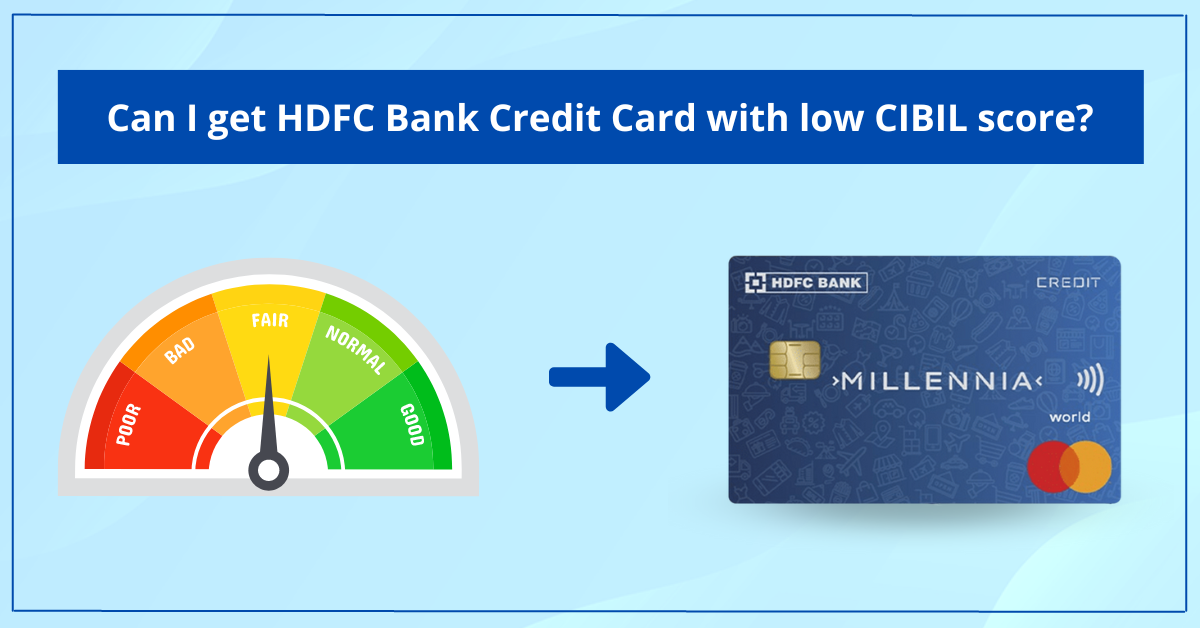Whenever you apply for an HDFC Bank credit card, the bank checks different things like your age, credit history, monthly income, CIBIL score, etc. to identify the risk associated with issuing you a credit card. The CIBIL score holds a lot of importance for credit card applications because it tells about an individual’s creditworthiness and repayment behaviour.
RBI has designated three different credit bureaus to issue credit scores and reports with CIBIL being the most prominent one used in India. The CIBIL agency determines a person’s CIBIL score which is a 3-digit number ranging from 300 to 900. Higher the score, higher the chances of getting approved for a credit card. Usually, a score of 750 or more is considered ideal by banks and other lenders.
Even though it is recommended to maintain a CIBIL score of over 750, you can also get an HDFC Bank credit card if your CIBIL score is lower than this. Those who have a CIBIL score less than 750 get a lower credit limit and are charged higher interest as compared to individuals with a higher credit score. There can also be limitations on the use of the card for a person with a low CIBIL score. There is no fixed minimum credit score to apply for a credit card and HDFC Bank runs background checks on the CIBIL score and other parameters when an individual applies for a credit card.
A low CIBIL score is not good and you must maintain a higher score if you want quicker loans and better offers. A low score can be very bad for people who need money urgently because the chances of rejection are high.

Here is how to work on quickly improving your CIBIL score –
Make timely repayments – Do not miss your EMIs or credit card payments as settling your outstanding debt has a positive impact on your credit score. You can set reminders because if you delay your payments, you will have to pay penalties as well as take a hit on your CIBIL score. You can even use autopay services so that there are no missed payment deadlines.
Keep credit utilization ratio low – Do not take an amount of debt that you cannot pay on time. You should keep the number of loans minimal and use around 30% of your credit card limit. If you take one loan after another, you will fall into an unforgiving debt trap without enough funds. Keep credit utilization low so that you can repay your bills on time and improve your CIBIL score.
Mix up different credit products – Maintain the right combination of credit products. You can combine secured loans like car loan, home loan, etc. with unsecured loans like credit cards, personal loans, etc. These loans will have different tenures and you can plan a healthy repayment cycle to maintain your CIBIL score.
Check your co-signed and joint accounts regularly – Make sure to check out all your accounts because you are liable for missed payments on any of these accounts. Your credit score could take a hit because of your joint account holder’s negligence. Try as much as possible to avoid being guarantor of loans or a joint account holder.
Regularly review your credit score – Regularly check your CIBIL score and credit report for any inconsistencies. Sometimes, the bureau makes mistakes while updating your records, delays recording of details, or enters wrong information. For example, you may have repaid an existing loan but it may not be updated in your credit report. Get any such errors corrected immediately to avoid a negative hit on your CIBIL score.
Therefore, you may get an HDFC Bank credit card with a low CIBIL score but your credit limit will be low and you have to pay higher interest. It is recommended to be responsible with your debts and maintain a good CIBIL score.